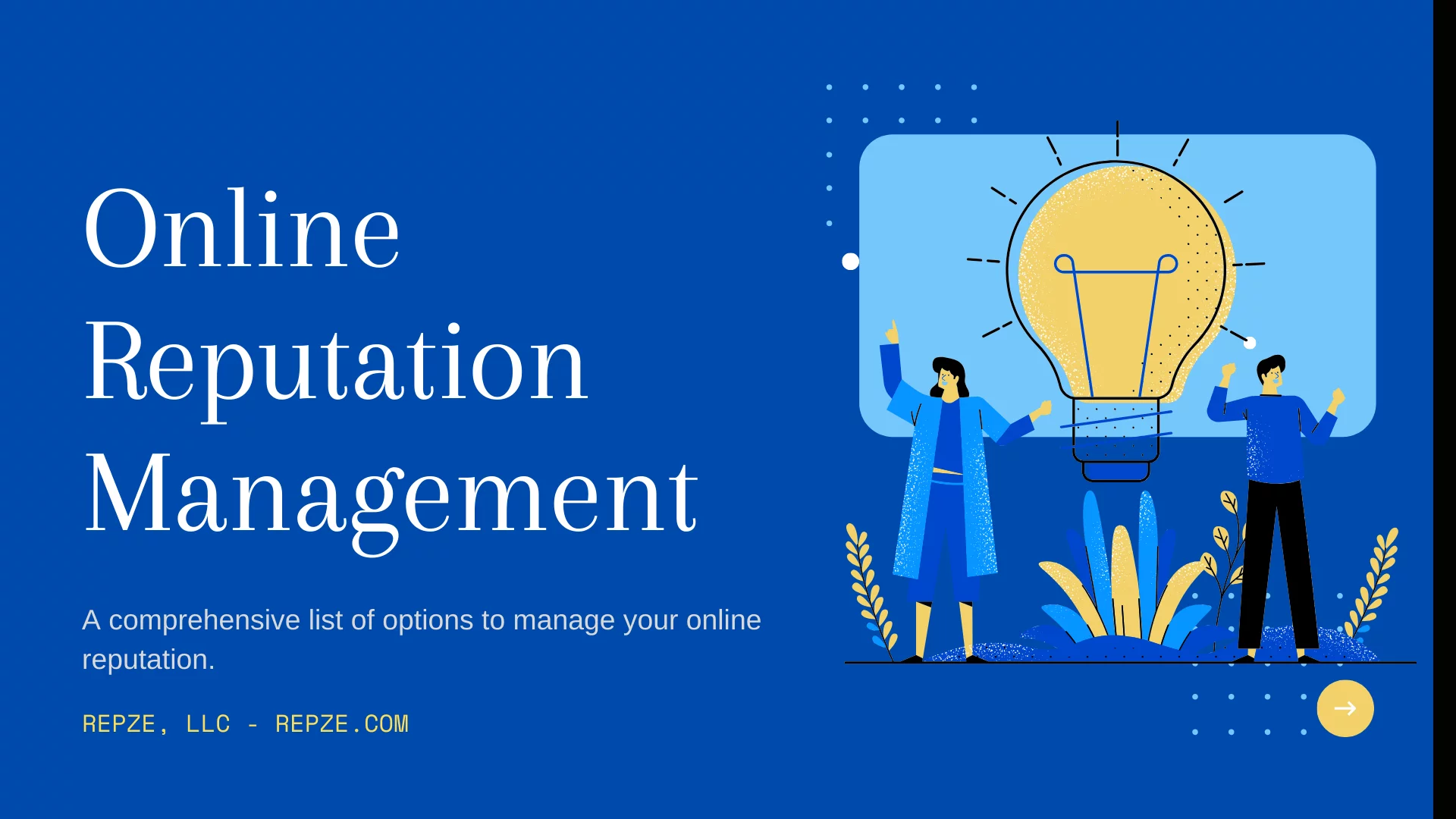Your presence on this page indicates your interest to learn about the Tools, Strategies, and Services of online reputation management, or you might have already learned and looking for ways to put a boost to your brand’s online reputation.
We have developed this paper with the mere intent to inform our valued readers of the idea of reputation management and its rising importance in almost every business sector.
This paper begins with a thorough introduction of reputation management other notions pertinent to it (such as reputation protection, crisis management, Negative Content Removal) and suggest you the most optimal ways to yield the best out of the internet!
Besides, one of our acquaintance agencies adheres to all those points suggested in the report.
So, buckle up while fleeting through this article, and if you would like to incorporate the ORM tips we reveal here into your business, you may reach out!
Contents
Online Reputation Management
In this world of digital interconnectedness, users hold all the power to assess the point at which you stand in the competitive era within a matter of seconds.
What is online reputation management?
Online Reputation Management, referred to as ORM, eReputation is a reputation of the person, brands, or any entity found on the internet. It can be positive, negative, or neutral.
Why is online reputation management critical?
The online reputation of the businesses or persons is crucial because it directly influences the sales of products or services. A positive reputation helps sell more products or services, while a negative reputation leads to a severe decline in revenue.
What are online reputation management services?
Online reputation management services include creating a favorable web property to cover up the negative search results amongst the major search engines. Sometimes ORM services include direct removals of negative reviews and contents.
How much does online reputation management cost?
The ORM campaign for small-sized businesses starts at 3,000$ per month, and it goes up to 10,000$ per month for medium-sized companies and 100k+ per month for big brands.
A company’s reputation directly mirrors the brand to the entire world, where poor reputation means comprising valued customers, disappointing potential investors, and declining the business rating to a significant low.
Hence, preserving a solid reputation is the only way out.
Poor reputation and an unwelcome brand are consequences of some hurtful comments, bad reviews, low ratings, and market controversies, which can make your brand highly vulnerable to poor performance.
For this, reputation management is an ultimate resolution that can safeguard, monitor, and manage to develop and preserve a constructive online and offline reputation.
Read More: How To Remove Negative Content From Google
Reputation Protection
Protection of the reputation over both online and offline platforms requires heaps of time and effort, which boosts the search landscape of your brand and protects it from potential unforeseen risks.
In other terms, reputation protection is just another element of the upbeat reputation management plan that inoculates your brand’s recognition and digital recognition.
A strong reputation is momentary.
Negative feedback, controversies, harmful reviews, and fewer ratings can diminish your recognition and make your brand plunge.
To combat such happenings, reputation protection is an ideal strategy that is enduring, boosts resistance, and develops a robust digital appearance of your business.
Reputation protection can keep you sheltered from unexpected risks and help to sustain an unparalleled digital status.
Crisis Management
A Majority of companies experience several situations of crisis throughout their business cycle.
A crisis can show up any time, in any conditions or sort, and possibly end up damaging or even shutting your firm.
Crisis management is an all-inclusive tactic that demonstrates how a company should avert, monitor, and cope with the consequences of a corporate crisis.
According to the Institute for PR (2017) report, crisis management is an option developed to avert or decrease a crisis’s harm to a business and other parties associated with the company.
As a phenomenon, crisis management has not been just one thing; it could be segmented into three stages, i.e., pre-crisis management, crisis response, and post-crisis management.
The initial phase, i.e., pre-crisis management, groundwork, or crisis prevention, is planned.
During the second crisis management phase, a firm concretely reacts to the crisis.
Whereas, during the third stage, a firm remains on the quest to find new avenues to effectively buckle up for the potential future crisis.
During this phase, the company also attempts to satisfy the promises made during the actual crisis, along with follow-up data.
This three-stage approach of crisis management works as the instituting outline for any firm.
Scandals and Controversies
Business Dictionary (2020) refers to this phenomenon as an extensive public incident, which is led either by a company’s engagement or allegation of a company’s attention in one or more than one unauthorized, unethical, and problematic practice.
Usually, in the case of scandals and controversies, there are inquiries regarding the firm’s practices that are either reportedly unlawful or explicitly evident to be illegal.
Corporate/Business scandals and controversies are thus originated from the claims of ethical behaviors or actions, by lawful judgment or choices, or the junction of both.
These might also occur because of people in a strong performance on their behalf irrespective of their consideration.
Poor Brand Image
Poor brand image, which is also dubbed a brand crisis, can be a consequence of corporate misconduct, social/consumer responsibility break, product disaster, executive misconduct, weak corporate outcomes, usual mischief, controversy, or lack of customer support (Greyser, 2009).
Harmful Comments
Digital media is a unique public platform that holds its norms and compliance needs. The conventional means of customer service and user linkages might not be sufficient now.
Hence, companies are exposed to many harmful outbursts that could be sent in the form of comments on social networks, such as criticisms, inappropriateness, or disapproval.
Chiosa and Anastasiei (2017) studied the impact of harmful comments on the wellbeing of a company. According to the research findings, the authors reveal that negative comments might alter users’ perception towards the brand and give birth to negative word of mouth.
This also poses significant risks to the purchase intentions of users.
Chiosa and Anastasiei further specify that ‘avoidance of identity is a more pertinent digital WOM predecessor than adverse emotions, which actively and directly impacts hate towards the brand.
Three Reasons Why Your Online Reputation Is Important!
- It accounts for an outstanding market share!
A comprehensive study by Zook (2017) displays the following images, which shows that nearly 25 percent of the overall market share for a business is generated directly due to its reputation.
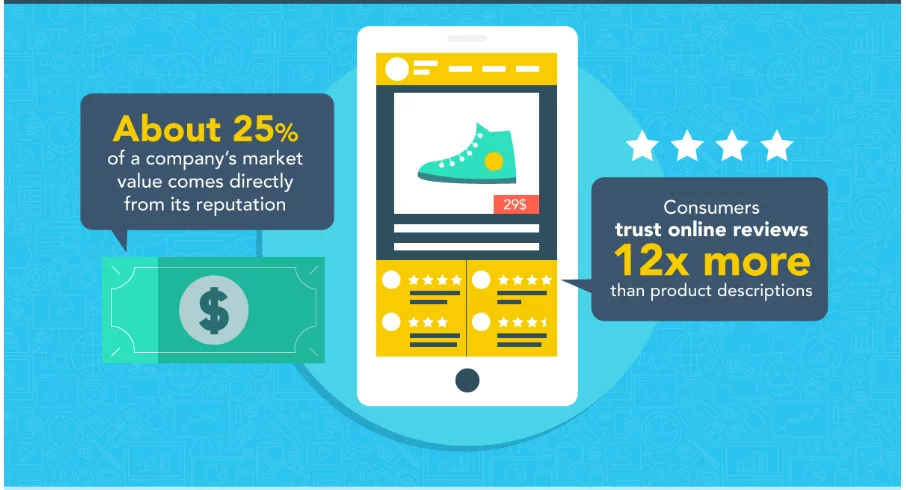
So, if there is any negative word-of-mouth, criticizing customers or online bashers of your brand, you might end up dropping 25 percent of your brand’s value – no matter what they said was genuine or not!
It is also essential that customers rely upon online reviews 12 times more than the product details you post over the website. Hence, it states that your reputation goes a long way for effective operations!
- Because your executive finds it essential!
Needless to state, every brand needs to have a strong reputation. However, as the consequences might seem abstract, many of them do not believe in it!
This mainly goes for executives. According to Zook’s article, nearly 87 percent of executives suppose that taking care of a brand’s reputation is more essential than looking after its strategic threats.
This depicts that seven out of eight c-rank employees strongly believe in a brand’s reputation management.
However, Zook found that just a petite rate, i.e., 15 percent of executives adhere to the guideline of reputation management.
This might come up due to a range of reasons, the foremost being that many executives just do not understand the essence of the internet’s power!
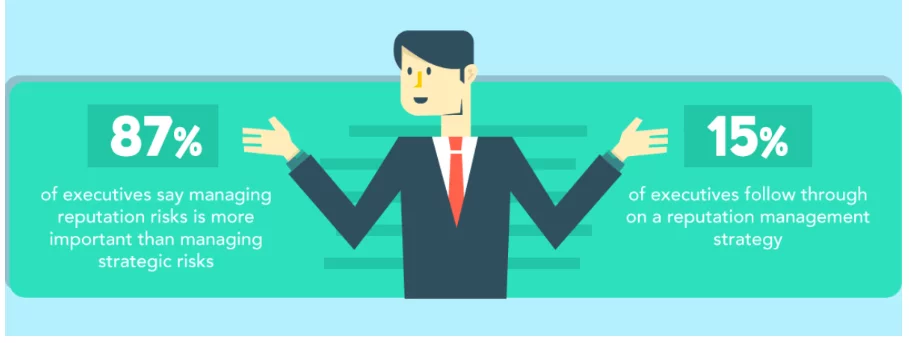
So, what do you learn from this?
If you plan to boost your brand’s reputation, you will have to put it top on the list!
- ORM goes hand-in-hand with product sales!
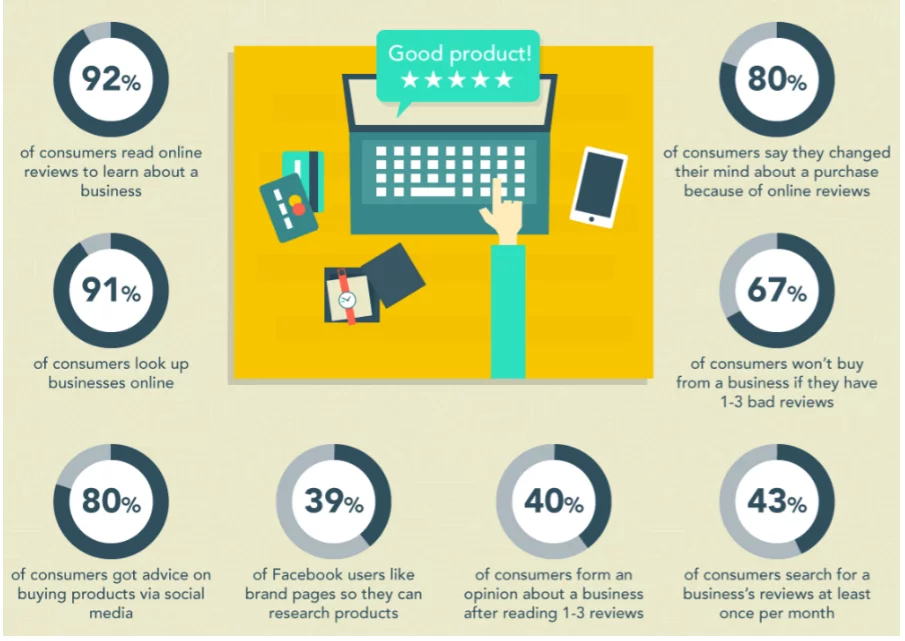
Zook, in his report, mentions that 92 percent of users read online reviews to learn about a business.
On the other hand, 80 percent of them received advice on purchase through their social media investigation.
Hence, if you have poor reviews over there, you may end up damaging those sales figures big time!
Disasters in Online Reputation Management
In the case of Online Reputation Management, there are two forms of negative aspects that you should consider as the ones you may perhaps trip over!
Criticisms on social websites show the first. They ought to be considered closely.
However, unless your brand has a severe lacking, they don’t put you at any most significant risk of reputation harm.
The second, which I dub as the “Grenades of Online Reputation,” are the ones that pose great harm to your brand recognition as well as put your sales at the risk of long-enduring damage.
Online Reputation Grenades are pretty influential than social website criticism, and these are apparent in the search engine results.
Imagine a potential customer who plans to purchase from you soon, Googles your name, and discovers reproachful information.
- Negative Coverage from Media:
I suppose that there remains no such thing as negative publicity.
This might sometimes occur for scandalous firms or famous individuals like Janet Jackson. Here, I list some forms that these reputation grenades can take over the internet:
Yet, harsh coverage from online, print, or visual media could adversely influence people and businesses most of the time.
Here, we take an instance of how just due to a single Tweet by the American President, Donald Trump smashed Amazon’s brand reputation.
Trump quoted:
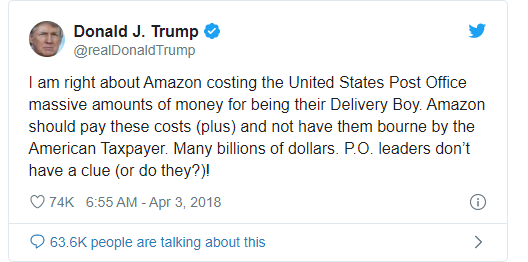
According to Franck (2018), the market share of Amazon fell immediately after Trump’s tweet and soon went minus that day. That’s how severe harmful content could harm a brand!
- Negative reviews:
Websites allowing users to post their experience about your brand are among the few platforms you should keep an eagle’s eye on! Did the customer be in favor of your offering?
Will he suggest others use it? Negative reviews on these websites can pose a significant impact on your business’ sales, where just monitoring the negative posts on these platforms might not be sufficient.
You must thoroughly comprehend getting them removed or being friends with someone who can do it for you!
- Hate Websites:
Some individuals go further from just posting negative reviews.
They develop specialized online platforms to post negative information, few unlawful holding content.
These hate websites often call out to businesses and brands with abuse and fake data.
It is unnecessary to state that a Google page showing *NAMEOFYOURBRAND Exposed” or “YOURBRANDNAME fraud/con” will push your likely users way afar from making a purchase – thus declining your sales.
Response To ORM Disasters?
How must you retort to all the negativity that is being spread? How should you shield your brand or your business from such kind of illicit occurring?
As per the scope of the challenge, there are numerous ways that you may embrace to retrieve your online reputation:
- Conduct continuous cyber scrutiny:
Suppose external entities have severely attacked your brand reputation. In that case, it might become imperative to work with an expert online analyst to scrutinize the undetectable risks and aggressors through email-tracking, cross-indexing of data, or other tools information assemblage.
Online scrutiny is the ideal route to reach the core of troublesome reputation management cases.
An example that fits here is that of the e-retailing website, Amazon.
It is reported that social media sentiments were opposed significantly for the worst when Amazon launched a swing of deals called Prime Day on their 20th anniversary.
It didn’t take much time for people to develop some witty trolls on the company.

Though amusing, this significantly impacted Amazon’s sales that day. Hence, one should always undertake online/cyber scrutiny to shoo away any defaming content.
- Robust SEO:
If someone searches your brand/business’ title on Google, showing on the first or second page of the engine, the information would be way more essential than that available on your website.
At a glance, the pages would exhibit many top-ranked online platforms discussing your business.
Suppose destructive content is present on those pages. In that case, you are ought to immediately develop a search engine optimization plan that boosts the ranks of constructive information for your business, published by either you or other entities.
The SEO game is too essential to be avoided, possibly the initial step for reinstating your reputation.
- Elimination of Negative Reviews
Did someone broadcast something negative or untrue for your brand?
Is that post published with the intent to harm your image instead of share an experience?
Does it involve inappropriate terms?
If so, you mustn’t waste a while.
A lawful rejoinder or a fast-paced reaction shall make it easy to eliminate the negative review.
Get back to them, always and after!
Positive or negative, you ought to be getting back to each review posted for your brand.
Do not forget that the influence goes way above what the specific user who posted it perceives about you (albeit somewhat critical).
While just a tiny sum of users may post reviews, hundreds of thousands read through those. Brands that do not get back to negative reviews gives the observers two potential messages:
(1) the accusation may be true,
(2) you do not care enough to attend to the pleas of your customers.
Either of them is sufficient to harm your brand’s perception for a long time!
No matter if that’s an accusation or your brand/someone associated with your brand made a blunder, reach out and apologize as Walmart does:

Speeding Up Response Time on Social Platforms
A Content Analyst at Business.org, Miss Drake, quotes:
“Be in the habit of responding to customer emails within a short amount of time. At most 48 hours, but preferably sooner. The longer you make customers or clients wait, the more negative their experience, and the more likely they’ll turn to social media to vent their frustrations. This will help to prevent little issues from becoming big issues. The quicker you can turn around a problem, the better protected your online brand is.”
Business.org
Your online response time sets a limit and keeps those negative reviews from spreading like wildfire; the sooner you ice it down, the more you avert your reputation from breaking apart
ORM Statistics for 2020
Here, we present some interesting statistics regarding online reputation, which shows how important it is for your business to keep a persistent check online! Research by Bright Local (2020) and Status Labs (2020) finds:
- 85% of users rely on online reviews as much as one-to-one referrals.
- Good reviews account for 73% of making users have more faith in domestic brands.
- Acquaintances are now believed to be as reliable as experts.
- 64% of people depend on search engines when digging out information regarding a brand.
- A poor reputation increases the per hire cost of a business by 10 percent.
- 15% of users do not buy from companies that previous users do not review.
- 77% of customers perceive that reviews posted three months earlier are not pertinent.
- A whopping 97% of customers read website reviews for companies, having 12% reading them each day.
- Online reviews are the 2nd more influential rating aspect for Google’s domestic package.
- Reviews pose a 7% impact on rankings over Google search findings
- Google provides 25% more clicks to brands who reach up to 5 stars
- 49% of users claim that a company should have a minimum of 4-star ranking to rouse them to purchase.
- 30% of users claim that they favor a brand based on responding to online public reviews.
What proportion of users goes through online reviews?
As per a study by BrightLocal, 97 percent of users review a brand online, from which 12 percent do it each day religiously.
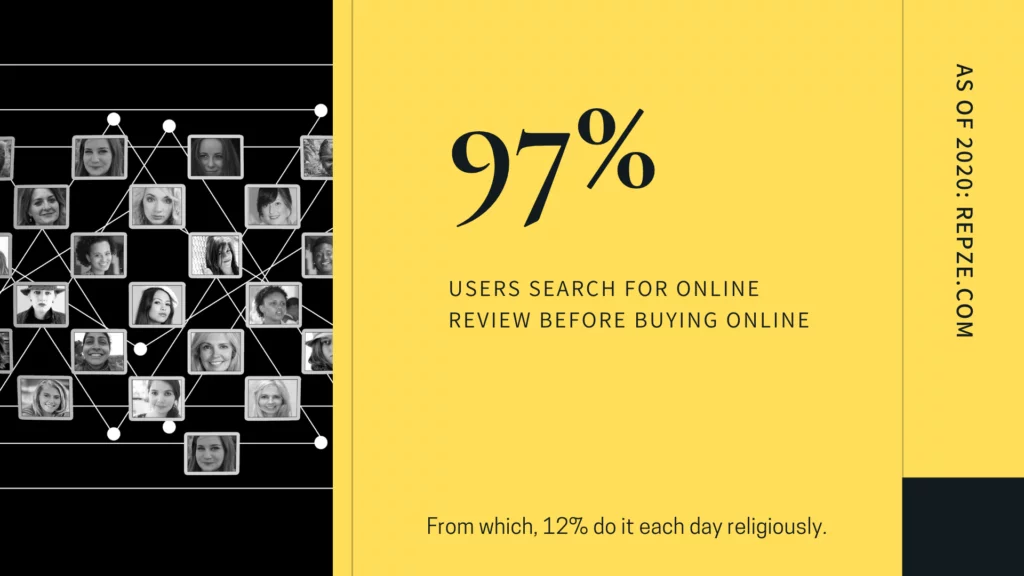
As the online reputation figures claim, these statistics should not be shocking.
Needless to state that making full use of the internet to search for local brands is a global phenomenon in developed countries.
What’s important is the extent to which users trust what they view online.
The figure below shows that people from 18 to 54 years of age trust online reviews if these appear authentic and there are multiple reviews.
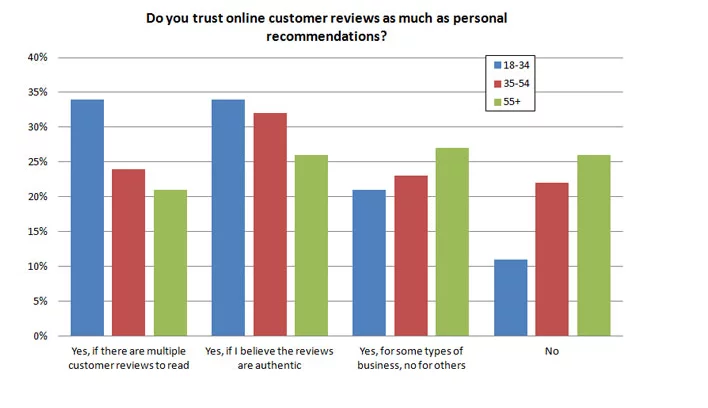
Do positive reviews make your business a more reliable place?
According to Campbell (2020), people develop a greater sense of trust after reading good reviews about a brand online.
He stated that one of the critical pointers of faith is just the appearance of the brand over the search findings.
A 2017 article in the Financial Times puts the issue starkly:
“Unexpected crises can destroy businesses and reputations. Boards, chief executives and their managers may believe they have a firm grip on the risks they face. They should think again.”
FT, 2017
Now more than ever, people search online to find information and formulate opinions on people and businesses.
Only 5% of people look past the first page of Google, so the first page online impressions are needier than the real life.
How can you establish a robust online reputation?
Schuhmann (2020) recommends five critical tips that one should practice if in need of a strong reputation online:
Get your business counted in directories
Like the phone directories, online directories enable customers to look for the brand’s online site by industry (product/services they promise).
Getting your brand listed over online directories shall direct user traffic, from where the other reputation management tools will come into charge.
Develop a Blog
Developing your blog, i.e., religiously boosted with posts that range from introducing your business and its offerings (Public Relations) to how you utilize tools or even reflection of the customers or product, supports manifesting you as a business Guru!
The most important thing here is to be uninterrupted with the articles – a minimum of two pieces a week – while sticking to the trend!
Strengthen Reviews
Schuhmann (2020) labels online reviews as exceptionally critical. As per a survey by reputation (2019), 92 percent of users look for online reviews.
To tell, even more, a whopping 89 percent of users are likely to believe in online reviews.
You should be cheering users to post positive reviews about your firm and the products you offer on different social networks available on the internet.
Earn Some Popularity
You certainly would not be able to set up a good reputation by just sitting back in your seat.
You will have to go head-on! We’d suggest you step out there and develop articles or other material, engage online advertising tools brand management, and take your name as high as possible.
Go Social with Your Brand
As mentioned in reputation’s (2019) article, 78 percent of users think it’s imperative to search on the content or a company over the internet before planning or working with them.
Suppose you hold an active grip on your business image over social media. In that case, you increase the probability of having more users come across your business, and it is perceived as a brand with a good reputation Schuhmann (, 2020).
Why Are Online Reviews So Important for Local Biz?
Roughly any sector you can name out has a particular bespoke review network.
For instance, for health and medical, they have this web called Healthgrades; LawTally for Lawyers; TripAdvisor for tourism and accommodating and a range of other platforms available to be accessed at any time
Here are four reasons why online reviews could be the key to reputation management:
- They are all around!
This belief has led to the launch of more and more review sites, which further stimulates the presence of online reviews and offers users different platforms to express their feelings and opinions.
‘Reviewing’ as a notion has also turned more eminent, and you will now be able to witness rating (out of 5 stars) along with organic search findings, such as with paid search advertisements on AdWords as well as on the local pack results on Google Local.
- They set your rank
A study conducted in 2017 revealed that online reviews had been essential elements that set the ranking of a firm, where there remains an evident link amidst the number of positive reviews, negative reviews, and responses in local search outcomes (Bright Ideas 2020).
- They can enhance click-through via GMB profiles.
Users significantly rely on online reviews – 87% of users search for firms with a 3-5 star rating before purchasing a domestic business.
Hence, once you list down your brand in Local Google’s 3-Pack, good reviews posted by users can boost your click-through rate. Check the visual below by Chadha (2019):
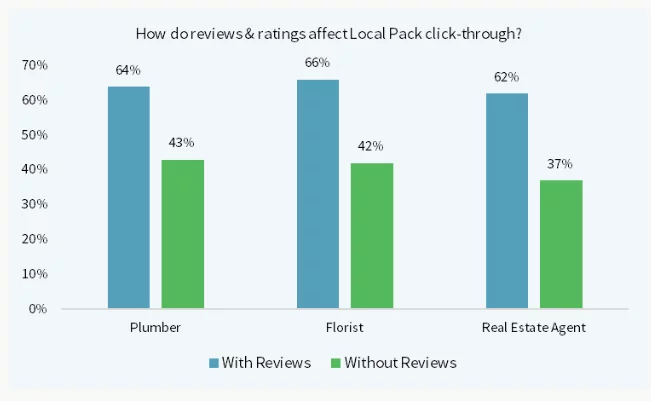
- Reviews act as social evidence
Social commerce is consistently in progress, which means that online reviews can influence the purchase choice of consumers in many different ways.
A study by Open Influence revealed that 47% of social media users in the United States purchased from Facebook, as Chadha (2019).
Which Tools Can Hold Your Online Reputation Intact?
There is a range of online tools that you can use at hand without having dedicated software.
For instance, Google, Facebook, and Twitter work ideal for brands to carry out constant online scrutiny.
Some websites come with the option to send you an alert every time someone talks about you, whereas other websites like Yelp.com would not offer you signals that can be used in many different optimal ways.
Bright Ideas (2020) recommends the following well-regarded tools of online reputation management:
- Twitter Search
Twitter has turned out to be among the most exemplary networks to keep a check on your reputation.
Almost everyone over Twitter retweets information. The power of Twitter search is that it further enables you to put up advanced details like place, link, sentiment, account, and so forth.

- Social Mention
Social Mention is a social network form of Google Alerts. It supports you to investigate your business over various social networks across the internet. You may subscribe, request email notifications, or get the Excel version of the statistics.
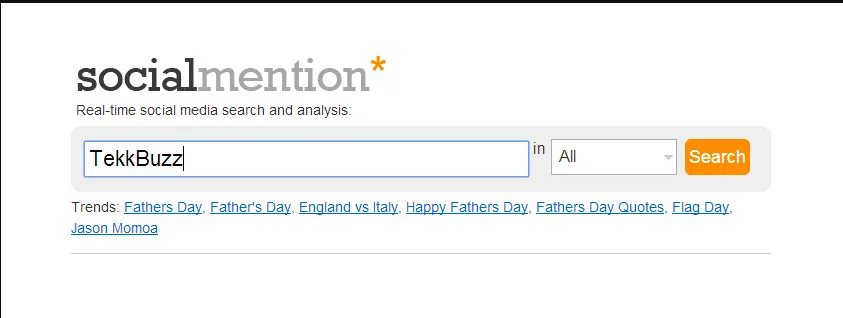
- Yahoo Alerts
You can subscribe to Yahoo Alerts by specifying local news, news, stocks, keywords, and so forth. Yahoo will send you notifications via mobile, email, or messenger for no money.
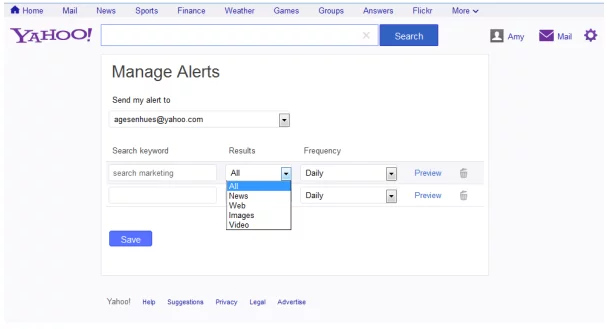
- Hootsuite:
Besides using its core feature to schedule online posts, brands also use Hootsuite to track what people want to say about them over the internet.
Establish a transition of news for Twitter, Facebook, or any other application to find the places where your company’s name has been mentioned.
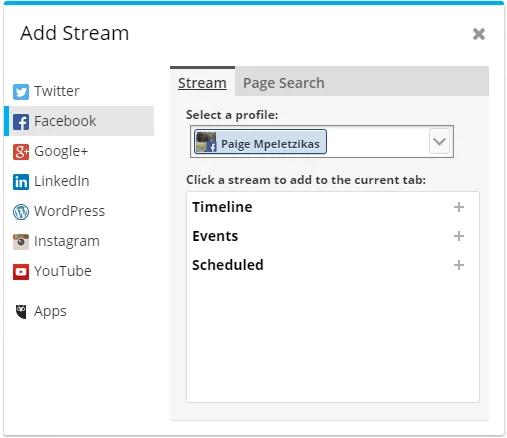
- Google Alerts
Google Alerts is one of the most used tools for holding brands’ online reputation intact.
It allows you to monitor website findings, blogs, videos, news, and group searches.
There is no better place to monitor its brand call-outs other than Google Alerts – I suppose.
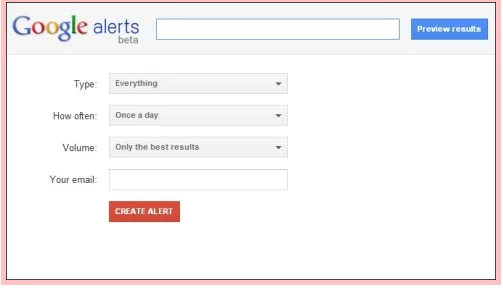
- BoardTracker
Some negative reviews mentioning your business may go below your attention over the internet.
However, BroadTracker keeps you from missing out on essential things.
It filters discussion platforms for traces of your or your business’ name.
Regular searches do not require you to pay; however, its premium version shall be up anytime soon (Aangela, 2013).
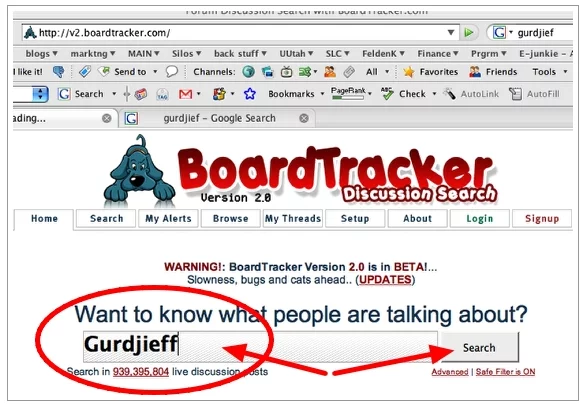
- BrandMentions
However, this one’s somewhat similar to Google Alerts for social networks.
BrandMentions deliver prompt search findings from videos, pictures, news, blogs, articles, or beyond.
You just want to develop an alert to be notified or download a real-time alert widget.
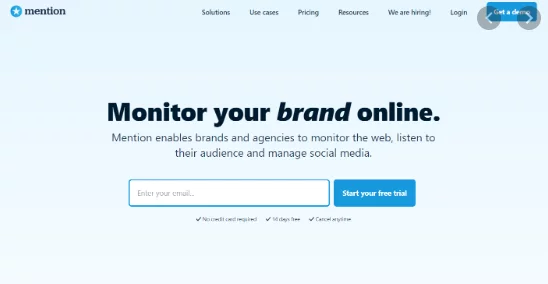
How To Deal With Negative Reviews?
Upon researching, we were impressed with a comprehensive YouTube Video posted by Neil Patel, who shares ideal tips to deal with online critics:
- Visualize your Google’s First Page as Your Business Card.
First impressions are supposedly the last, and sometimes, a cover is enough to exclaim how the book will be.
If your brand – God Forbid – goes along any adversarial terms like “con” or “fraud” over the internet, it’s undoubtedly ended for it!
- What’s Your User Sentiment?
It is essential to know what people suppose of you.
Strong online reputation does not just entail responding right to what users comment about your business, service, or products; however, it further entails contemplating if you should react at all and, if so,
how?
At times, a comeback is not required, where at times, a reaction posted too late could fail your brand acutely.

- Develop Respect for Your Brand
Neil Patel, in his report, claims that trust is a fragile element, which is tough to attain.
Developing a sense of respect for your brand is more essential than any other aspect of online reputation. If needed, one should go the extra mile for it!
- Be Exceptionally Transparent
As per BusinessWeek, after a while of covering up criticism, negative reviews over the internet publically led McDonald’s to augment the breeding standards of animals as per the people for Ethical Treatment of Animals request.
We’d suggest not covering up negative reviews (but eliminating), or they turn out as a more significant crisis in the future.
- Respond Swiftly and Courteously
Neil states that if your brand has been receiving criticism over Twitter, a steady and plain “We are mindful of the concern. We have been trying to get rid of it and will get back to you as soon as we can” would be more appropriate than a late response with further insights.
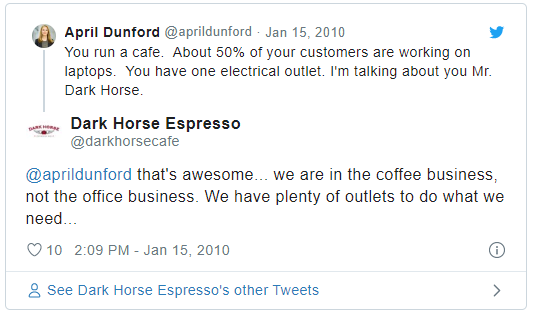
- Take Critics Seriously
A scandal spread in the users of Whole Foods, whose CEO John Mackey’s WSJ op-ed on the health service reform launched by Obama.
In a time of 2 days, the firm delivered a response note stating that there have been “Many views on the problem, as well as that in our firm” and allowed others to express their thoughts on the concern.
Isn’t this how you should deal with the critics?
Ultimately, progress from the past.
A quick and simple note of apology (given you made a slipup) will work as a douse to the fire! (Patel, 2020).
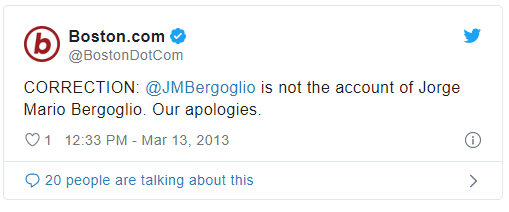
Plan on hiring a dedicated reputation management agency to incorporate all the above tips and keep a persistent check on your brand over the web. RepZe LLC might be your ideal solution. Here are a couple of cases we recently dealt with:
Case Study: Top Executive’s Reputation Revived
The Problem
A leading executive at a multinational corporation was trapped under malevolent forged cheating reports on the websites listing cheaters, which got viral worldwide in seconds.
He reached out to RepZe and narrated to us this tale of him falling prey to the libel and how the news, in no time, went trending that harmed the overall image of the firm that he was associated with.
Furthermore, the executive and his company suffered a significant drop in brand status because of the malicious activity.
Interventions
Upon being given charge of this brand’s reputation management, RepZe swiftly reacted and applied its optimized technical content eradication tools to remove the harmful figures about the firm on cheaters’ reporting pages. The elimination of adverse and disparaging information enabled the search engine findings to be modified positively for the executive, gradually bringing back his and his firm’s positive image.
RepZe did eradicate the harmful information from all the online platforms, eventually removing this broadcast washing it off from the root. RepZe reacted swiftly to this spreading news and streamed it down the drain in just a little time duration to help them recover from the overall damage.
The Upshot
Because of our prompt retort to the problem, the executive could rapidly refurbish his image, hence limiting any future hurdles for the firm. The executive and his firm are now secure from defamatory data and can progress seamlessly despite obstacles (RepZe LLC, 2020).
Case Study: Financial Firm Secure Its Reputation
The Problem
A leading financial firm was confronted with several aggressive messages that overpowered all the positive reviews and ratings they had accomplished by now. These comments remaining on a famous rating website gained more and more exposure – weakening the firm’s broad recognition and customer regard.
Interventions
RepZe evaluated their corporate recognition and turned up with a plan to get it back in real-time. Our content eradiation experts took charge of the case and supported the firm to bring down the unwanted, damaging comments to tweak the challenge promptly. We cooperated with the client firm to accelerate their constructive recognition through our positive reputation services and gave their extra brand momentum.
RepZe brilliantly detached all the destructive criticism regarding the firm from the page and revived its label to ensure enhanced results over online search engines. We brought back their positive image by managing the transition of supreme quality and valuable content to deliver them a strong push.
The Upshot
Our proactive response to the brand crisis heightened their widespread recognition and the public preference for the firm, which was radically reinstated. Evidence of this is the firm’s current status; a year into our all-inclusive resolution, the firm remains free of any online criticism and is doing way better than before.
What’s RepZe, and How Can It Manage Your Case?
RepZe is a product of a passionate team of experts thriving with the ambition to empower companies and people with their brands that could support them in the long run.
The company was established on the ideology of effective reputation management and safeguarding the digital confidentiality of businesses and people.
Our dynamic service portfolio achieves and preserves a strong brand image, whereas the exceptional team of in-house professionals serves 24/7 to fulfill your business needs.
At Repze, we prioritize customer satisfaction and always remain in the quest of supporting businesses to gear up their reputation for an enduring triumph.
By RepZe’s dynamic portfolio of reputation management services, your firm can develop an enduring, sustainable and unmatched plan to illustrate the best of your brand.
In a nutshell, it will undoubtedly be advantageous to keep a constant check on the web and monitor your online reputation. However, hiring someone who can do it for you more optimally is even rewarding.
After all, the likelihood of flying a negative review below or radar or missing out on crucial customer posts falls to zero as your brand remains under solid expert command.
Contact us now for our services through our email, [email protected]. You can reach us through this line (970) 458 8143 or at 9615 E County Line Rd-Ste. B#444, Centennial, CO 80112.
References
Aangela. (2013). Top 25 Free or Cheap Reputation Management Web Apps | UpCity. Upcity.com. Retrieved 22 April 2020, from https://upcity.com/blog/top-25-free-or-cheap-reputation-management-web-apps/.
Balmer, J.M. and Greyser, S.A., 2009. Corporate brand reputation and brand crisis management. Management Decision.
Bright Ideas. (2020). What Is Online Reputation Management? | BrightLocal. BrightLocal. Retrieved 21 April 2020, from https://www.brightlocal.com/learn/what-is-online-reputation-management/.
Bright Local. (2020). Local Consumer Review Survey | Online Reviews Statistics & Trends. BrightLocal. Retrieved 17 April 2020, from https://www.brightlocal.com/research/local-consumer-review-survey/.
Business Dictionary. (2020). What is a corporate scandal? Definition and meaning. BusinessDictionary.com. Retrieved 12 April 2020, from http://www.businessdictionary.com/definition/corporate-scandal.html.
Campbell, K. (2020). Two thousand twenty online reputation management statistics. Blog.reputationx.com. Retrieved 17 April 2020, from https://blog.reputationx.com/online-reputation-management-statistics.
Chadha, R. (2019). Facebook Leads Competitors for Last-Click Social Commerce – eMarketer. Emarketer.com. Retrieved 15 April 2020, from https://www.emarketer.com/Article/Facebook-Leads-Competitors-Last-Click-Social-Commerce/1016684.
Chiosa, A. R., & Anastasiei, B. (2017). Negative word-of-mouth: Exploring the impact of negative messages on consumers’ reactions on Facebook. Review of Economic and Business Studies, 10(2), 157-173.
Franck, T. (2018). Trump bashes Amazon for a fourth time in a week, claiming the post office loses ‘massive amounts’ serving internet retailers. CNBC. Retrieved 19 April 2020, from https://www.cnbc.com/2018/04/03/amazon-shares-turn-negative-after-trump-bashes-company-for-a-fourth-time-in-a-week.html.
Institute for PR. (2017). CRISIS MANAGEMENT AND COMMUNICATIONS. Institute for Public Relations. Retrieved 14 April 2020, from https://instituteforpr.org/crisis-management-and-communications/.
Patel, N. (2020). Neil Patel. The Definitive Guide to Online Reputation Management. Retrieved 20 April 2020, from https://neilpatel.com/blog/guide-to-reputation-management/.
Reputation. (2019). Reputation.com | Reputation Management, Reputation. Reputation.com | The online reputation management leader. Retrieved 18 April 2020, from https://www.reputation.com/.
Top Executive Overcomes Viral False News with the help of RepZe. RepZe LLC. (2020). Repze.com. Retrieved 15 April 2020, from https://repze.com/case-studies/c-level-executives-fake-news-eliminated/.
Schuhmann, A. (2020). Reputation Management | 5 Ways to Build | Pronto Marketing. Pronto Marketing. Retrieved 21 April 2020, from https://www.prontomarketing.com/blog/reputation-management/.
Status Labs. (2020). 100 Reputation Management Stats for 2020 | Status Labs. Status Labs. Retrieved 15 April 2020, from https://statuslabs.com/reputation-management-stats-2020/.
Zook, C. (2017). Why Your Company’s Reputation Matters [Infographic] | WebFX. WebFX Blog. Retrieved 20 April 2020, from https://www.webfx.com/blog/marketing/companys-online-reputation-important/.

